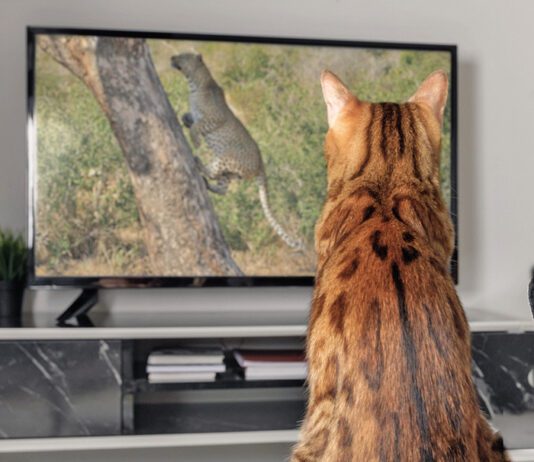Why Cats Climb Curtains and Scratch the Sofa
Cats can seem soft and gentle, but beneath the fur and the purr are claws that can rip and teeth that can bite into furniture, clothing, carpet and more. Scratching is the most common type of feline destructive behavior, but it can also take other forms. Cats may chew plants, climb curtains or knock over objects because they are playing and exploring, seeking owners attention, or trying to get outside, says Pamela Perry, DVM, Ph.D.
Cat Scratch Fever Spikes in January
Hand-wrestling your kitten or newly adopted cat may seem like harmless play, but if either would happen to scratch you, you could develop an infection requiring treatment for cat scratch disease (CSD). This rare but potentially serious condition is estimated to affect about 12,500 people annually in the U.S., including 500 hospitalized for treatment. The incidence is higher than medical experts anticipated, according to a new study released by the Centers for Disease Control (CDC).
When Cats Demand Nonstop Attention
When your cat walks between your legs, paws at your ankles or edges into the space between your neck and the sofa, he has one goal in mind: He wants to get close to you. The behavior can help further your bond - theres no need to stop it. But when he walks over your keyboard while youre trying to work or meows nonstop, attention-seeking behavior becomes annoying or even destructive - for example, if you lose work that you hadnt saved.
When the Weather Outside Is Frightful
With good care from loving owners, indoor cats can enjoy a great life, but when the temperature plummets, they can benefit from some extra TLC. The most valuable advice from a specialist in emergency and critical care: Come winter, the most important thing is to keep pets indoors where its warm, says Elisa Mazzaferro, MS, DVM, Ph.D., ACECC, at Cornell University Veterinary Specials in Stamford, Conn.
Welcoming an Outdoor Cat Indoors
A stray cat has begun visiting your yard and youve been feeding him. Hes open to friendly advances and you wonder if he would benefit from a real home. Or perhaps following a close call, you wonder if your indoor cat, who frequently goes outside, should remain in the house for safetys sake. One significant challenge you may face in transitioning an outdoor cat indoors is an existing cat who doesnt welcome newcomers and attacks the new cat.
Night Stalkers and Bedtime Howlers
At the end of a long workday, you look forward to uninterrupted slumber, but your cat has other plans. In two hours, he jars you awake by leaping on the bed - knocking the air out of you. An hour later, he swats a book off your nightstand. And 30 minutes before your alarm sounds, he begins loud, demanding meows.
From Barn to Bedroom; Sleeping With Pets
An article in the February issue on alternatives to relinquishing pets to shelters featured a dashing photo of Rascal, a feral cat who was neutered, vaccinated and adopted to work as a Rodent Ranger. A small study by the Mayo Clinic Center for Sleep Medicine in Scottsdale, Ariz., suggests that owners sleeping with their pets can experience positive effects. Replies to a questionnaire from 150 consecutive patients found that nearly half had pets; 41 percent had several.
The Deal With Oily Cat Fur
Your cat has always sported a shiny coat, soft to the touch. You marvel at the time he dedicates to grooming. But lately when you pet him, his coat feels greasy and you detect an odor. His grooming clearly is off, and its a worry.
Free Reign of the House and Stem Cell Research
A survey of more than 10,000 pet owners in 11 countries - 3,100 of them in the U.S. - has found that U.S. owners are the most passionate about their cats. In addition to the U.S., the renovation and design firm Houzz asked owners about pets in the home in Canada, France, Italy, Spain, Sweden, Denmark, Russia, Germany, Australia and Japan. Veterinarians frequently prescribe therapeutic diets and daily medication for cats with chronic enteropathy, a condition characterized by excessive loss of plasma proteins into the gastrointestinal tract. However, the regimen can have side effects, and some owners have difficulty complying with it.
6 Ways to Get Your Cat Off the Counter (And Other High Surfaces)
Your curious, agile cat effortlessly leaps and lands on the top of the refrigerator, deftly missing your glass serving bowl. Your first instinct may be to scold him, grab his front legs and oust him off the refrigerator. Such a response could bring you face to face with an angry, frightened cat who may lash out or bite you during the tussle. In your attempt to shoo your cat, he could also lose his balance, falling hard on the floor and injuring himself.
Ask Elizabeth: June 2015
I recently adopted a beautiful kitty named Annie, and she has won my heart. Unfortunately after bringing Annie home, I discovered that she had some real neurological issues. She rocks back and forth and falls constantly when moving from room to room. Her veterinarian says that she has idiopathic [undetermined origin] vestibular syndrome. I do not think that she is going to get any better. Can you shed some light on this condition?
The Truth About Litter Box Aversion
Thinking outside the box has become a clich, but its still a praiseworthy trait. When your cat eliminates outside the litter box, however, its a problem. House soiling - urination or defecation any place other than in a litter box - is a major reason that owners surrender their cats to shelters. Cats dont avoid the box because theyre being spiteful. Theyre raising an alarm. Cats who eliminate outside the litter box are communicating to their owners that something is wrong, either with a specific aspect of their box, their health or relationship with another member of the household - feline or human, says Pamela Perry, DVM, Ph.D., a lecturer in animal behavior at Cornell University College of Veterinary Medicine. It is the most commonly reported feline behavior complaint to veterinary behaviorists.

















